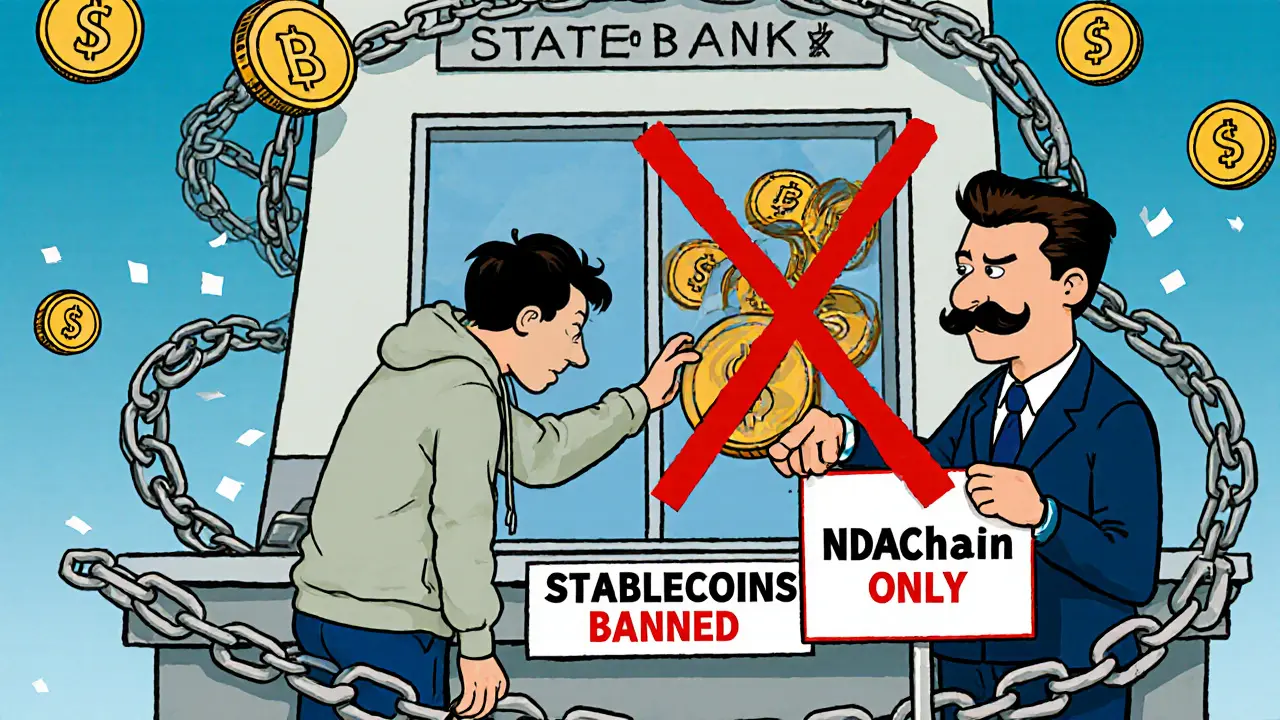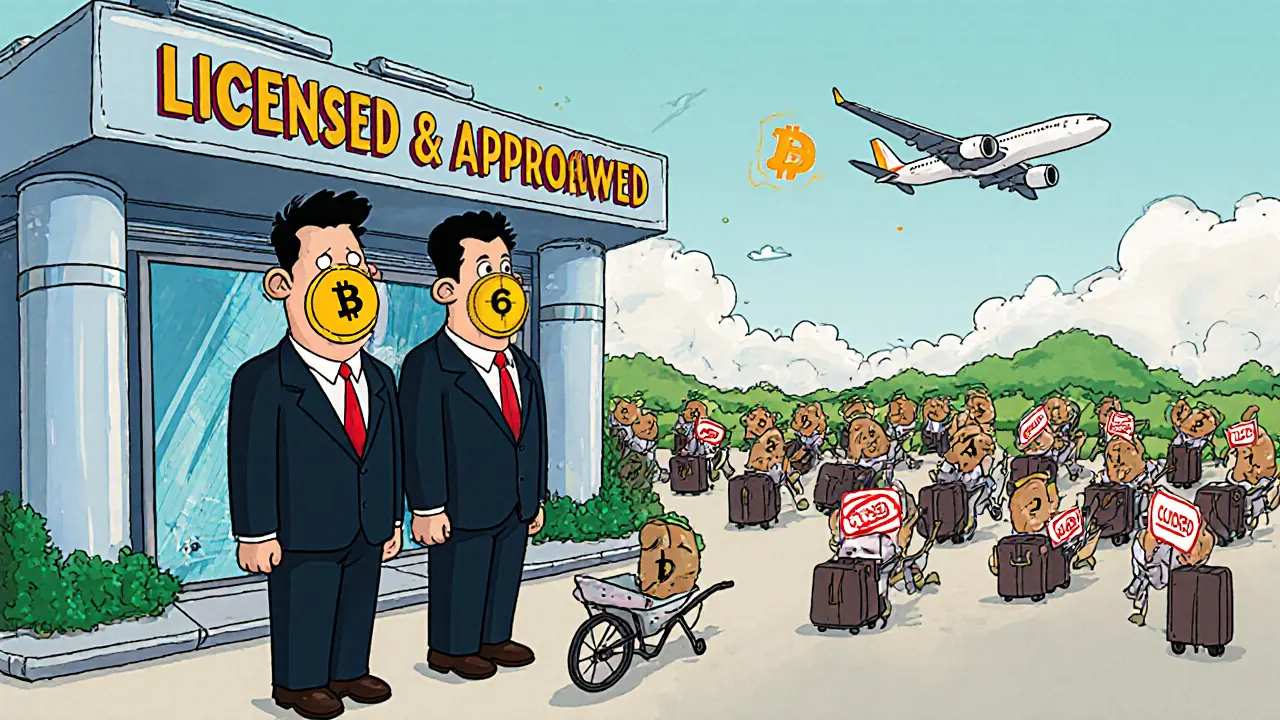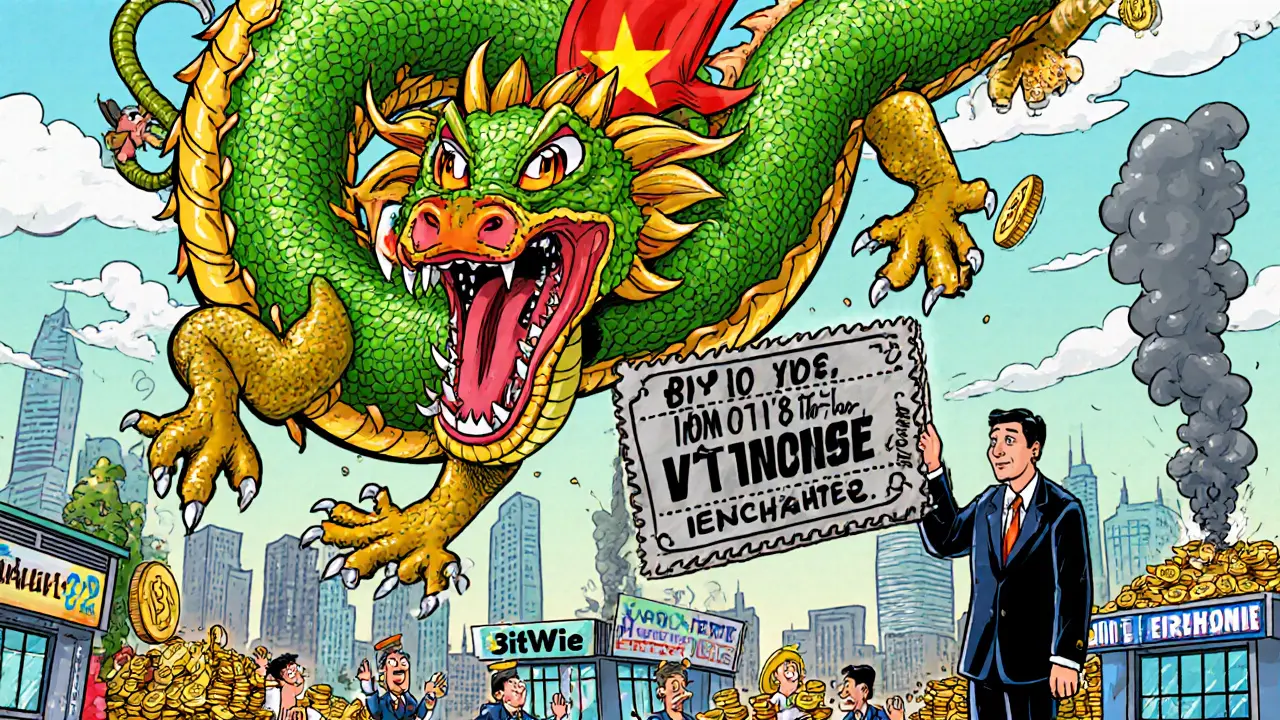Vietnam Crypto Exchange Capital Requirement Calculator
Convert Vietnam's Exchange Capital Requirement
This tool calculates the equivalent value of Vietnam's 10 trillion VND capital requirement for crypto exchanges ($379 million USD) in different currencies and shows how it compares to regional regulations.
Equivalent Value
$379,000,000.00 USD
Regional Comparison
How Vietnam's requirements compare to other Southeast Asian countries:
| Country | Minimum Capital Requirement | Foreign Ownership Cap |
|---|---|---|
| Vietnam | 10 trillion VND ($379M) | 49% |
| Thailand | 500 million THB ($13.7M) | 100% |
| Singapore | Variable (based on scope) | 100% |
| Indonesia | Not applicable (retail banned) | N/A |
| Malaysia | 50 million MYR ($10.6M) | 100% |
Potential Impact
What this regulation means for the crypto market in Vietnam:
85% of users may lose access
Industry estimates suggest only 3-5 licenses will be granted in the first year, meaning 85% of Vietnam's 21 million crypto users could lose legal trading options.
Small exchanges must close
Most small operators with 5,000-50,000 users can't afford the $379 million requirement. The article reports many small exchanges like 'HanoiTrader88' will be forced to shut down.
Tax implications
Starting November 15, 2025, capital gains will be taxed at 0.1% for trades under 100 million VND and 0.3% for larger trades. All licensed exchanges must report transactions to tax authorities.
On September 9, 2025, Vietnam’s government dropped a regulatory bomb: Resolution No. 05/2025/NQ-CP, also known as Directive 05/CT-TTg. It didn’t just tweak the rules-it rewrote them. For the first time, cryptocurrency exchanges operating in Vietnam must now meet a capital requirement of 10 trillion VND (roughly $379 million USD). That’s not a suggestion. It’s a hard wall. And it’s reshaping everything about how crypto works in the country.
What Exactly Is Directive 05/CT-TTg?
This isn’t a guideline. It’s a legal framework. Signed by Deputy Prime Minister Ho Duc Phoc, it’s part of Vietnam’s broader Law on Digital Technology Industry passed in June 2025. The goal? To bring order to a market that had grown wildly without oversight. With an estimated 21 million active crypto users, Vietnam had become one of the top two countries globally for adoption-behind only Ukraine. But most of those trades happened on unregulated platforms. No KYC. No accountability. No protection when things went wrong.
Now, the Ministry of Finance is the only body allowed to issue licenses. And no exchange can operate without one. The rules are clear: you must prove you have at least 10 trillion VND in capital. At least 65% of that-6.5 trillion VND-must come from institutional investors based in Vietnam. Foreign investors? They can own up to 49%. That’s not a small barrier. It’s a gatekeeper.
Why the $379 Million Cap?
Why such a high number? The answer lies in history.
In 2022, during the crypto winter, 15 unregulated Vietnamese exchanges collapsed. Over half a million users lost money. Some platforms vanished overnight. Others froze withdrawals for months. The public outcry was loud. The government couldn’t ignore it.
Dr. Nguyen Minh Tuan, director of Vietnam National University’s Economic Policy Institute, put it plainly: “The capital requirement, while seemingly high, is necessary to prevent the market instability we witnessed.” He’s right. A $190,000 exchange like the one run by Reddit user ‘HanoiTrader88’-which had served 5,000 users for two years-can’t survive under this rule. That’s not a mistake. It’s intentional. The government wants only deep-pocketed players who can absorb losses, survive crashes, and stay solvent.
But there’s a catch. The World Bank warned that this might displace 18-20 million users. Why? Because most exchanges won’t qualify. Industry analysts estimate only 3-5 licenses will be granted in the first year. That means 85% of today’s users might suddenly have nowhere to trade legally.
VND-Only Transactions: No USD, No EUR, No Stablecoins
Here’s where it gets even more restrictive. All trades must happen in Vietnamese dong (VND). No direct USD, no EUR, no Bitcoin-to-USDT swaps. That’s huge.
Why? Because the State Bank of Vietnam has long feared capital flight. In 2025, an estimated $10.2 billion in crypto transactions flowed through Vietnam-87.4% of it unregulated. That’s money leaving the country, bypassing banking controls. By forcing everything into VND, the government keeps every transaction traceable, taxable, and controllable.
But here’s the real problem: stablecoins. They made up 63.8% of all crypto trades in Vietnam in 2025. USDT, USDC, BUSD-they’re the glue that holds global crypto markets together. But under this law, you can’t issue or trade any stablecoin backed by fiat currency. That’s a direct ban. And it’s a massive blow to traders. Why? Because converting VND to USDT was the easiest way to hedge against inflation or move value quickly. Now, that door is shut.
Platforms will have to build new asset-backed tokens-maybe gold-backed or commodity-backed-but that’s untested territory. No one in Vietnam has done it at scale. And it’s not clear if users will accept it.

Technical Requirements: Blockchain, KYC, and Surveillance
It’s not just about money. You need tech.
Every licensed exchange must use blockchain technology that complies with Vietnam’s National Cryptography Standard (TCVN 13057:2025). That’s a government-approved system called NDAChain, launched in July 2025. All transactions must feed into it in real time.
Plus, KYC and AML protocols must meet the highest local standards-matching Vietnam’s 2023 Anti-Money Laundering Law. That means verifying every user’s identity, tracking every transaction, and reporting anything suspicious to the State Bank of Vietnam.
And yes, the government will see it all. There’s no privacy here. The system is designed for surveillance, not anonymity. That’s a big shift from the libertarian roots of crypto. For many users, that’s a dealbreaker.
How Does Vietnam Compare to Its Neighbors?
Let’s put this in context.
| Country | Minimum Capital Requirement | Foreign Ownership Cap | Stablecoin Allowed? | Transaction Currency |
|---|---|---|---|---|
| Vietnam | 10 trillion VND ($379M) | 49% | No (fiat-backed) | VND only |
| Thailand | 500 million THB ($13.7M) | 100% | Yes | THB + USD |
| Singapore | Variable (based on scope) | 100% | Yes | SGD + USD |
| Indonesia | Not applicable (retail banned) | N/A | Yes (institutional only) | IDR only |
| Malaysia | 50 million MYR ($10.6M) | 100% | Yes | MYR + USD |
Vietnam’s rules are the strictest in the region. Thailand’s requirement is less than 4% of Vietnam’s. Singapore’s is flexible and open. Indonesia bans retail trading entirely. Vietnam walks a middle path: it allows retail trading, but only under extreme financial control.
And it’s working-sort of. While Thailand has licensed 12 exchanges, Vietnam might only license 3-5 in the first year. That’s not innovation. That’s consolidation. And it’s happening fast.
Who Wins? Who Loses?
On Reddit, the debate is fierce.
‘HanoiTrader88’ wrote: “This kills my small exchange business overnight.” He’s not alone. Thousands of small operators who built loyal customer bases with low fees (0.15% vs. global 0.25%) are now out of business.
But then there’s ‘SaigonVC’: “Finally some regulation! Last year I lost $455,000 when BitViet disappeared.” For institutional investors, this is a win. They want safety, not speed. They want to know their money won’t vanish.
And the users? A CoinGeek survey found 68.3% support regulation for security. But 79.6% think the capital requirement is too high. And 41.2% say they’ll move to offshore platforms if local options shrink.
That’s the real risk: a brain drain. If you can’t trade legally at home, you’ll go elsewhere. And Vietnam will lose its position as a crypto adoption leader.

What’s Next? The Six-Month Clock Is Ticking
The law took effect immediately. But there’s a grace period: six months after the first license is issued. That’s the trigger. No one knows when that will happen. The Ministry of Finance says applications open within 30 days. First licenses? Maybe 90-120 days after that.
That means the clock starts ticking in early 2026. By mid-year, unlicensed platforms must shut down. That’s not a soft landing. It’s a cliff.
Compliance costs? $1.9 million to $7.6 million per platform, according to legal analysts. That’s not just capital. That’s legal fees, tech upgrades, audits, staff training. Most small exchanges can’t afford it.
And tax rules? They’re coming. By November 15, 2025, capital gains will be taxed at 0.1% for trades under 100 million VND, and 0.3% for larger ones. That’s low-but it’s still a tax. And it means every trade is now tracked by the state.
Will This Work?
It’s too early to say. But the stakes are high.
Vietnam wants to grow its digital economy from 9.5% of GDP to 20% by 2030. Regulated crypto is supposed to contribute 1.2-1.8% of that. But if users flee, if innovation dies, if platforms can’t operate, that goal vanishes.
The government is betting that control equals stability. That heavy capital requirements prevent fraud. That banning stablecoins protects the currency. That surveillance ensures compliance.
But crypto was built on openness. On decentralization. On trustless systems. Vietnam’s model is the opposite. It’s centralized. It’s controlled. It’s bureaucratic.
Will it work? Maybe. But at what cost?
One thing is certain: the era of unregulated crypto in Vietnam is over. The next chapter will be written by a handful of well-funded players, under strict government watch. For the average user, it might mean less freedom-but more safety. For entrepreneurs? It might mean the end of the dream.
Is cryptocurrency legal in Vietnam now?
Yes, but only through licensed exchanges. Buying, selling, and trading crypto is legal if done through a platform approved by the Ministry of Finance. Unlicensed exchanges are now illegal and must shut down after the six-month grace period following the first license issuance.
Can I use USDT or other stablecoins in Vietnam?
No. Stablecoins backed by fiat currencies like USD or EUR are explicitly banned under Resolution 05/2025/NQ-CP. Only asset-backed tokens not tied to traditional currencies are allowed, and no such tokens are currently approved or widely available in Vietnam.
Do I need to pay taxes on crypto trades in Vietnam?
Yes. Starting November 15, 2025, capital gains from crypto transactions will be taxed at 0.1% for trades under 100 million VND and 0.3% for trades above that amount. All licensed exchanges are required to report transaction data to tax authorities.
Can foreigners own a crypto exchange in Vietnam?
Yes, but only up to 49% ownership. The majority (at least 51%) must be held by Vietnamese individuals or institutional investors. This rule is designed to ensure local control over financial infrastructure.
What happens to small crypto exchanges in Vietnam?
Most will be forced to close. The 10 trillion VND ($379 million) capital requirement is far beyond what small operators can raise. Only large financial institutions or well-funded Vietnamese conglomerates are likely to qualify. Many small exchanges with 5,000-50,000 users will have no choice but to shut down or move operations offshore.
Will this make crypto safer for users in Vietnam?
It should. Licensed exchanges must follow strict KYC/AML rules, use government-approved blockchain systems, and maintain high capital reserves to cover losses. This reduces the risk of platform failures like the 15 collapses in 2022. However, users may face fewer choices, higher fees, and less flexibility in trading options.
What Should Users Do Now?
If you’re a casual trader: keep your funds on a licensed exchange once they launch. Avoid unlicensed platforms after mid-2026-they’ll be shut down, and your money could disappear.
If you run a small exchange: start planning your exit. The capital requirement is impossible to meet. Consider selling your user base to a licensed player or moving your operations abroad.
If you’re an investor: look for opportunities in compliance tech. The need for KYC systems, blockchain integration, and audit tools is exploding. This isn’t the end of crypto in Vietnam-it’s the beginning of a new, tightly controlled phase.
The game has changed. The rules are written. Now it’s up to everyone else to adapt-or get left behind.

ty ty
November 11, 2025 AT 03:07BRYAN CHAGUA
November 12, 2025 AT 01:21Debraj Dutta
November 13, 2025 AT 17:26Edward Phuakwatana
November 15, 2025 AT 04:03Suhail Kashmiri
November 16, 2025 AT 19:12Arthur Coddington
November 16, 2025 AT 19:55Stephanie Platis
November 17, 2025 AT 09:51Michelle Elizabeth
November 18, 2025 AT 06:40Joy Whitenburg
November 19, 2025 AT 09:31Kylie Stavinoha
November 20, 2025 AT 04:25Diana Dodu
November 21, 2025 AT 09:45